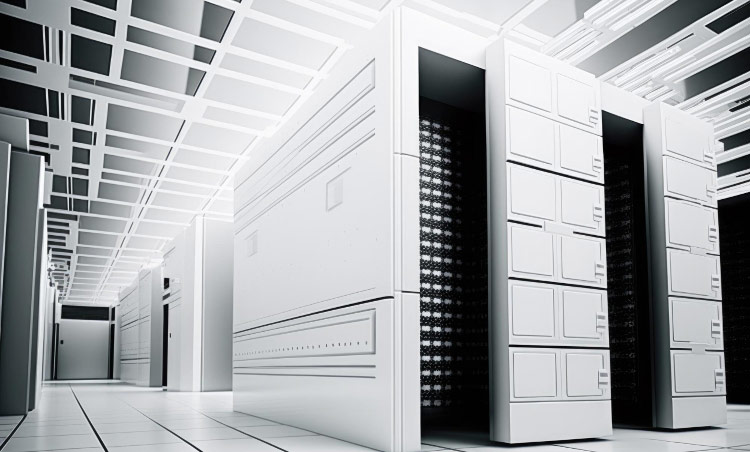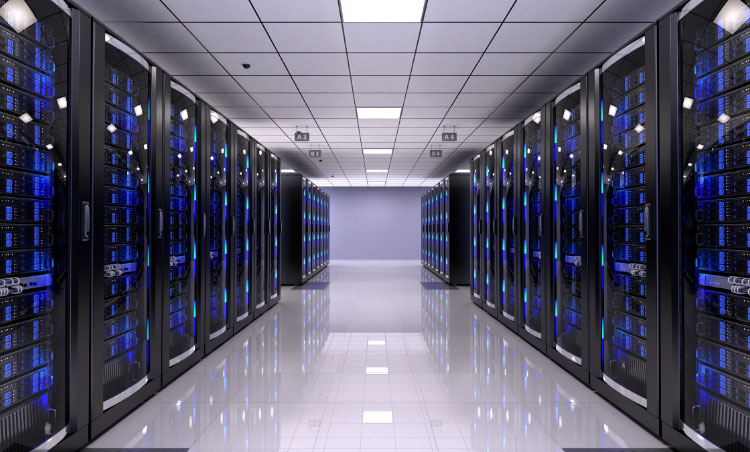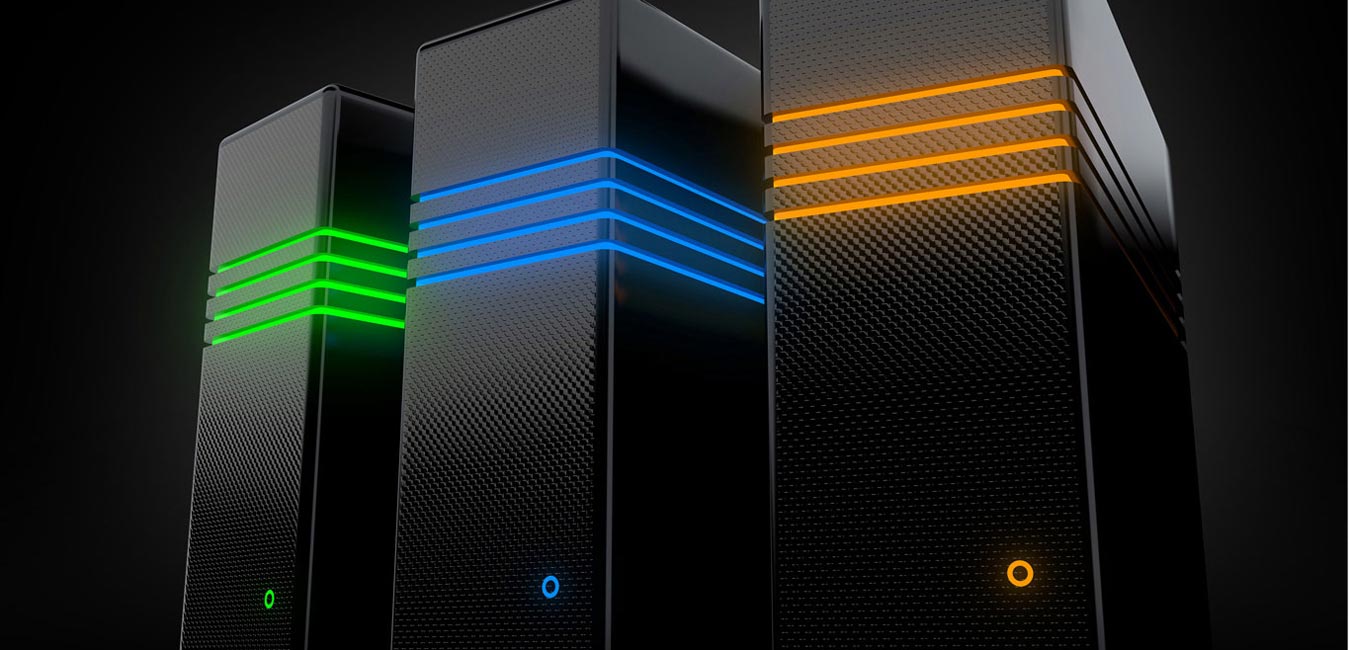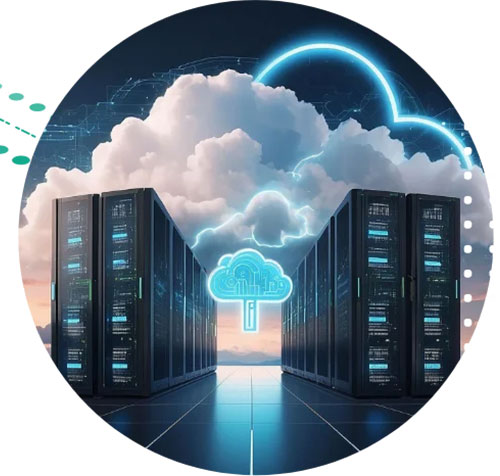Hyperscale Data Centers: Bringing Agility and Scalability across Enterprises
Hyperscale data centers are equipped with advanced technologies like virtualization, AI/ML-driven automation, and cloud computing, providing scalable, agile, and cost-effective solutions. In India, leading hyperscale computing companies offer state-of-the-art data center solutions offering robust security, redundant power, smart cooling systems, energy-efficient designs, and extensive network connectivity with cloud adjacency capabilities that modern businesses crave to accelerate their digital transformation journey.
The Benefits of Colocation Data Center Management for Enterprises
Data centers have evolved into becoming a crucial component of the digital IT infrastructure of many global enterprises today. The demand for data center services in India is experiencing remarkable growth as enterprises aim to deliver superior customer experience, accelerate innovation, and become digitally enabled.
According to 6Wresearch, the data center market in India is expected to grow at a CAGR of 10.7% during 2021-2027. This growth can be attributed to key drivers such as the Indian government’s push towards digitalization, increasing Internet penetration, data sovereignty, accelerated cloud adoption, increasing usage of IoT, and the rollout of 5G. Similarly, according to GlobeNewswire, the value of the data center market in India is expected to rise to $10.09 billion by 2027 at a (CAGR) of 15.07% in the period of 2022 to 2027.
Managing a data center in India is getting more intricate by the day in today’s digital landscape. Enterprises find managing data centers to be complex and time-consuming. They need professional expertise, substantial budgets, and excellence in IT infrastructure execution to manage data centers. To meet the evolving digital demands and ensure business continuity, enterprises are now resorting to colocation, i.e. outsourcing of data center management to professional service providers. This delivers cost savings and a range of benefits, including access to subject matter experts, improved operational efficiency, agility, scalability, risk mitigation, enhanced security, and compliance with industry regulations.
To know more about Sify’s colocation data center services read here: Colocation data centre
Advantages of colocation of data center management
Here are a few advantages of colocation of data center management for enterprises:
- Cost Savings: Building and maintaining a data center requires significant capital investment and operational expenses. By leveraging the model of colocation of data center management, enterprises can transfer these costs to a service provider that has already invested in infrastructure, equipment, and personnel. This empowers enterprises to free up capital that can be redirected toward other strategic initiatives. Additionally, it can help businesses avoid losses incurred from downtime and data breaches in the long run. Moreover, colocation positively impacts Water Usage Effectiveness (WUE) and Power Usage Effectiveness (PUE) by promoting improved energy efficiency. Utilizing the capabilities of Artificial Intelligence and Machine Learning, data centers can experience savings of up to 8% to 10% on PUE. This not only contributes to environmental sustainability but also helps enterprises meet their energy efficiency goals, while maintaining optimal performance and increased savings.
- On-demand Scalability: When a business grows, its IT requirements change significantly and may require additional space, computing power, and capacity. Colocation enables enterprises to easily scale up or down as per requirement without incurring additional capital expenses or disrupting their business operations. Data Center service providers can quickly deploy new servers, storage, and network infrastructure or adjust existing configurations to meet changing business needs.
- Automation and AI/ML: Implementation of AI/ML requires careful consideration across multiple parameters. Providers of colocation data center management services can handle large volumes of data, integrate with existing solutions, and enable predictive maintenance, which ultimately helps enterprises gain deeper insights for faster decision-making, automating processes, and delivering increased efficiency & security.
- Access to Subject Matter Experts (SMEs): Colocation of data center management gives enterprises access to subject matter experts who possess specialized knowledge and experience in data center operations. They come with skills, guidance, solutions, and recommendations that can help enterprises optimize performance and minimize risks as well as free up internal resources for performing core business operations.
- Enhanced Data Security: Data security has always been a major priority for enterprises. With data dispersed across multiple touchpoints in a hybrid work model, enterprises need a multi-layer security framework. Service providers ensure comprehensive security measures across the physical security of a DC and the data hosted across on-premise, colocation, or edge to cloud. Specialized service providers come with the expertise and systems to meet industry regulations, protect sensitive data, and minimize compliance risks. Enterprises must make sure that service providers offer:
- A designated Security Operation Center (SOC) to ensure robust and resilient security
- Faster intrusion detection and prevention through multiple protocols
- Data backup and recovery in different seismic zones
- Compliance with the latest data privacy regulations and industry standards
- Adherence to Service-Level Agreements (SLAs): By adhering to the pre-defined SLAs, enterprises can enjoy benefits such as improving operational excellence, accountability, performance monitoring, risk mitigation, and cost optimization. SLAs also ensure service providers deliver the expected quality of service, provide regular reports and establish procedures for addressing issues and non-compliance penalties, which benefit enterprises.
- Improved Reliability and Business Continuity: Colocation enables enterprises to improve reliability and business continuity through specialized expertise, scalability, planning, and improved security measures. Enterprises can leverage the experience of service providers, scale resources efficiently, and solve issues proactively. This ensures there are no disruptions in business operations.
- Constant Technological Advancement: The colocation of data center management provides enterprises with constant technological advancement, including cloud on ramp capabilities. Service providers offer expertise in emerging technologies, regular infrastructure upgrades, access to cutting-edge technology, flexibility, and smooth integration through private direct connections to the cloud. It allows enterprises to be resilient and future-ready without compromising on technology and connecting their on-premises infrastructure to cloud computing systems.
Evaluate your data center needs to make the right choice
When an enterprise identifies a service provider for data center management services, it must evaluate its options based on its unique business objectives and digital priorities. Enterprises must go beyond the basic minimum criteria and focus on key differentiating factors. They must choose a service provider that focuses on:
- Cloud vision and strategy
- Hyperscale partnerships
- End-to-end managed services across multi/hybrid cloud environments
- Interconnect services to other sites and partner ecosystems
Colocation of data center management can be a valuable strategy for enterprises looking to maximize their IT resources and stay competitive in today’s rapidly-advancing digital landscape.
Sify Technologies has been providing reliable and robust data center services for the last 22 years, with a razor-sharp focus on innovation and new technologies. With the objective of delivering delightful experiences, enhanced efficiency, and desired outcomes to our customers, we have equipped all our data centers in India with automation through AI/ML capabilities. This has resulted in creating a sustainable ecosystem of connected data centers. We offer enterprises benefits such as zero downtime, reduced capital expenditure and operational expenditure, and around-the-clock support through our bankable digital data center infrastructure. Our efforts have delivered up to 20% improvement in the turnaround time to deliver critical projects.
What’s more! We also help enterprises realize up to 300 person-hour savings every month by automating customer billing. Our predictive approach to maintenance helps enterprises realize up to 20% reduction in MTBF, up to 10% improved MTTR, and up to 10% reduction in potential downtime. We comply with all the global standards and policies to prevent enterprises from penalties due to non-compliance.
Learn how our state-of-the-art data centers enable enterprises to achieve their desired business goals.
How to choose the right data center service provider for your needs
During the COVID-19 pandemic, it became increasingly difficult for organizations to manage their in-house data centers due to challenges with scalability, break/fix support, and operations and maintenance staffing requirements. As a result, many organizations moved their in-house data center to a colocation provider and some of their applications to public clouds.
Modern-day data center powerhouses provide not only the necessary infrastructure and state-of-the-art technology but also advanced data analytics and automation capabilities. They offer streamlined operations, business continuity, reduced Capex/Opex, flexible engagement models, superior end-customer experience, support for business expansion, and accelerated digital transformation, among other outcomes.
Selecting the right data center: Key factors in play
Data center service providers typically offer an extensive array of services to accommodate diverse customer requirements. These include on-premise solutions, colocation options, wholesale and retail offerings, hyperscale capabilities, as well as specialized offerings like built-to-suit (BTS) data centers, green data centers, and comprehensive managed services. Businesses can find tailored solutions that align with their specific needs and preferences. It is important to choose the right data center service provider that can provide such integrated services, based on your business objectives and digital priorities.
[Interested to know more about Sify’s world-class data center facilities? Learn more]
Here are some factors to consider when selecting a data center service provider:
- Scalability: Rack space is a critical and limited commodity for many service providers. Selecting world-class data center providers with the capacity to build campuses capable of accommodating 8,000+ racks and 50 MW IT capacity, for example, will enable businesses to plan their scale-up within their choice campus. They also stand to benefit from a robust support/service stack and comprehensive monitoring of the data center infrastructure.
- Security: Be sure to prioritize data centers with robust security systems. IT infrastructure protection, including data security through encryption, firewalls, intrusion detection, and prevention, needs to be implemented – at the very minimum. Your data center service provider should also have multilayer physical security from the perimeter wall up to the cage, including mantraps, turnstiles, and biometric access control, in addition to surveillance cameras and security personnel, to restrict unauthorized individuals from entering secure areas or accessing confidential information.
- Network connectivity: Choose a data center provider with excellent network connectivity, including multiple internet service providers (ISPs) offering IP transit nodes, high-speed connections, multi-cloud connectivity, data center interconnectivity, and connectivity to customer premises. Data centers should have at least 3-4 fiber entry paths to the building, ensuring seamless connectivity and resilience. Additionally, the presence of low-latency cloud on-ramp services, including cloud access nodes, facilitates fast and direct interconnection with public cloud applications. These aspects collectively contribute to creating a robust, efficient, high-performing, and well-connected data center environment.
- Certificates, SLAs, and compliance: When selecting a data center provider, the importance of having the necessary certificates and service level agreements (SLAs) cannot be overstated. Certifications from industry authorities are highly desirable as they validate the provider’s adherence to industry best practices, process reliability, and security standards. A tier-3 data center with ISO 27001, ISO 20000, PCI-DSS, SoC 1, SoC 2 and ISO 1400, and ISO 50000 certifications is ideal. With its robust compliance framework, 99.99% uptime, and clear SLAs outlining performance commitments, Sify’s data centers deliver the highest levels of security, operational excellence, and environmental responsibility to customers.
- Industry experience: Data centers that have subject matter experts across functions can prove instrumental in managing diverse workloads. Extensive cross-industry experience gives them the ability to address the unique requirements of various sectors, such as finance or healthcare. For example, as a leading data center service provider in India, Sify has extensive experience across diverse industry sectors. Sify’s digital data center infrastructure services offer real-time visibility, measurability, predictability, and service support specifically required by different industries to offer customers high availability and seamless experiences.
- Green power: Many organizations today have committed to ESG goals, such as carbon neutrality, waste reduction, and power conservation. In this context, it becomes important to choose a data center provider that is invested in renewable energy, achieved by signing Power Purchase Agreements (PPA). Solar and wind power are increasingly viable options for clean energy. By choosing a data center service provider that adopts sustainable measures including renewable power, energy-efficient equipment, and practices, your business can achieve environmental goals while benefiting from competitive energy costs.
Adherence to safety practices, rules, and regulations are also key EHS considerations. Leading green data center service providers, like Sify, invest in transparent, environmentally conscious, and ethical business practices, adhering 100% to local and global regulations, and outperforming the competition when it comes to sustainability, corporate social responsibility, and people practices.
[Going green? Know how Sify’s green data centers are pushing the envelope on sustainability. Learn more]
- Data center footprint: Data centers strategically located in multiple regions ensure low latency and high-speed network connections, enabling efficient data transmission and improved user experience. A widespread presence allows data centers to establish diverse network routes and redundancy, minimizing the risk of network failures or disruptions.
- Partnership with hyperscalers: Hyperscale partnerships enable data centers to offer seamless integration with leading cloud platforms, offering flexible hybrid cloud solutions and enhanced performance. Ensure you choose a service provider that banks on the power of partnerships and leverages the sharing of expertise and resources to stay at the forefront of technological advancements.
- Automation and innovation: AI/ML-driven automation is increasingly important in developing innovations that optimize operations, reduce costs, enhance performance, improve reliability and sustainability, and elevate service quality. Integration of AI/ML in vendor performance evaluation and SLA management, including metrics like MTTR and MTBF, further strengthens operations. For instance, Sify’s AI/ML capabilities have contributed to significant improvements of over 20% in project delivery turnaround time, showcasing the tangible benefits of data analytics in the data center domain.
- Backup and DR: It is essential to consider the risk of natural disasters such as earthquakes, floods, hurricanes, or wildfires. Select a location with minimal risk to ensure the safety and longevity of your IT infrastructure. It is also crucial to select a data center service provider with adequate backup and disaster recovery (DR) capabilities. This ensures that in the event of an unforeseen incident, the data center can quickly recover operations with little or no data loss.
Wrapping up!
While these parameters will provide you with a solid basis for comparison, allow yourself to make the final decision based on your business’s specific objectives. Remember, there’s no one-size-fits-all approach when it comes to choosing a data center service provider.
As India’s pioneering data center service provider for over 22 years, it has been Sify’s continuous endeavor to innovate, invest in, and integrate new-age technologies. Learn more about how our state-of-the-art data centers have been delivering transformative business value to enterprises across the globe.
Kotak Special Situations Fund to invest INR 1000 crores in Sify’s Data Center business
Mumbai, 1st November, 2021: Kotak Special Situations Fund (KSSF), managed by Kotak Investment Advisors Limited (KIAL) and whose LPs include leading Sovereign Wealth Funds, and Sify Technologies Limited (‘Sify’), India’s most comprehensive ICT service & solutions provider, today announced an agreement under which KSSF will invest up to INR 1,000 crore (USD 135 million) in Sify Infinit Spaces Limited (SISL), a wholly-owned subsidiary of Sify. SISL is a leading data center services player in India, serving Indian and Global enterprise customers and hyperscalers from its ten operational Data Centers across the country.
Under the transaction, the KSSF investment will be in the form of Compulsorily Convertible Debentures, which will convert into equity based on the operational performance of SIS over a specified reference period. The funds would be used to invest in SIS’ current plan under execution of developing new Data Centers in Mumbai, Noida, Chennai, Bangalore and Hyderabad and for investment in renewable energy requirements for its operational and new Data Centers for up to INR 4,000 crore (USD 530 million).
Raju Vegesna, Chairman and Managing Director, Sify said, “India is set for significant economic growth and is becoming the first choice destination for both global businesses and investors. India is witnessing the rise of Information technology-driven entrepreneurship and business growth. The current capacity of the Data Centre industry in India is expanding at an unprecedented pace, powered by wider cloud adoption, 5G rollout and accelerated digital transformation programmes of enterprises. We are delighted to partner with KSSF as a part of this journey to build world-class Data Centre facilities for our customers to benefit from the large scale digital transformation of India.”
MP Vijay Kumar, Chief Financial Officer, Sify said, “The hyperscalers and enterprise customers have shown high confidence in colocating to our Data Centers over time and these engagements continue to scale. The KSSF partnership will give us access to long-term capital, beyond the present investment. We will, as always, be prudent in our business judgements and build facilities close to assessment of customer demand and in a modular way, deploying the latest and most cost-effective technologies for both design and operations.”
Srini Sriniwasan, Managing Director, Kotak Investment Advisors Limited said, “We are delighted to partner with Sify to build out the Data Centre capacity in India and contribute to the goal of a digitally savvy India, based on the strength of Sify’s entrepreneurial capabilities and experienced management team. Data Centers are at the core of the country’s Digital India ambition, and we believe that with vibrant entrepreneurship in the digital space, rich media consumption by an exploding well-connected population and increasing requirements for local storage of data, India’s Data Centre sector is a long term secular opportunity.”
Eshwar Karra, CEO-Kotak Special Situations Fund, Kotak Investment Advisors Limited said, “Our investment in SIS is in line with our strategy of providing capital to unique India opportunities that require flexible and customised capital solutions, which enables us to grow with our partners and participate in their success while providing value-added support and opportunistic capital in size and scale.”
About Kotak Investment Advisors Limited
Kotak Investment Advisors Limited (KIAL), a part of the Kotak Mahindra Bank (Kotak), focuses on the Alternate Assets business. KIAL was set up in early 2005 to bring a sharper focus to Kotak’s alternate assets practice and has raised/managed/advised in aggregate over USD 4.9 billion across different asset classes including Private Equity Funds, Real Estate Funds, Infrastructure Funds, Special Situations Fund, Listed Strategies and Investment Advisory, all led by independent investment teams.
For more information, visit alternateassets.kotak.com
About Kotak Special Situations Fund
Kotak Special Situations Fund (KSSF) is an Alternative Investment Fund under SEBI regulations managed by the Alternate Asset Management Company – Kotak Investment Advisors Ltd. KSSF currently manages a USD 1 billion fund and is uniquely positioned to be a provider of customised solutions capital to corporates. KSSF has partnered with companies across sectors via customised structures/solutions depending on their situation, requirements and business prospects. With an ability to tactically participate across the capital structure of an enterprise, KSSF has been targeting value propositions across a spectrum of opportunities from growth, to credit situations and stressed assets.
About Sify
Sify Technologies is India’s most comprehensive ICT service & solution provider. With Cloud at the core of our solutions portfolio, Sify is focussed on the changing ICT requirements of the emerging Digital economy and the resultant demands from large, mid and small-sized businesses.
Sify’s infrastructure comprising the largest MPLS network, top-of-the-line DCs, partnership with global technology majors, vast expertise in business transformation solutions modelled on the cloud make it the first choice of start-ups, incoming Enterprises and even large Enterprises on the verge of a revamp. More than 10,000 businesses across multiple verticals have taken advantage of our unassailable trinity of Data Centres, Networks and Security services and conduct their business seamlessly from more than 1600 cities in India. Internationally, Sify has presence across North America, the United Kingdom and Singapore.
Sify, www.sify.com and Sify Technologies, www.sifytechnologies.com are registered trademarks of Sify Technologies Limited.
Forward Looking Statements
This press release contains forward-looking statements within the meaning of Section 27A of the Securities Act of 1933, as amended, and Section 21E of the Securities Exchange Act of 1934, as amended. The forward-looking statements contained herein are subject to risks and uncertainties that could cause actual results to differ materially from those reflected in the forward-looking statements. Sify undertakes no duty to update any forward-looking statements.
For a discussion of the risks associated with Sify’s business, please see the discussion under the caption “Risk Factors” in the company’s Annual Report on Form 20-F for the year ended March 31, 2021, which has been filed with the United States Securities and Exchange Commission and is available by accessing the database maintained by the SEC at www.sec.gov, and Sify’s other reports filed with the SEC.
For information, please contact:
For further information, please contact:
Sify Technologies Limited
Mr. Praveen Krishna
+91 44 22540777 (ext.2055)
5 Cool Features of the Next Generation Data Center
The relentless growth in the volume of data created every day, has compelled Data Center administrators to integrate new technologies and processes. With the global popularity of cloud computing, the role of Data Centers has extended beyond providing enough storage capacity with data security. Data Centers – optimized with various tools and services, are now transformed into strategic business assets. Here are five cool features of next generation Data Centers.
Software Defined Data Centers (SDDC)
In IT, everything is literally virtualized and delivered as a service. And the virtualization of Data Centers is the next logical step. The virtual layer is taking over in Data Centers, making them flexible, highly secure and extremely agile. Infrastructure and network, both are not just virtualized in a software defined Data Center but are delivered as a service also. Many mainstream mega-scale Data Centers are moving forward to gain edge with software-defined Data Centers.
Data Center Operating Systems (DCOS)
Data Centers have a diversified need for an extended control layer and the interconnectivity in Data Centers depend upon Data Center management. Many providers deploy Data Center operating control layers that manage resources, users and virtual machines to meet the needs of improving scalability of management infrastructure. Aiming at greater scalability, Data Centers are now better equipped for controlling various crucial components ranging from chips to cooling systems. The DCOS layer has considerably enhanced infrastructure due to its integration into every critical aspect of every Data Center.
Infrastructure Optimization with Agnostic Data Center
The next generation Data Centers will have layered management tools that can pool resources logically as per required workloads. This kind of infrastructure will only be obtained with an agnostic Data Center that lets admin to create more powerful and scalable cloud platforms. The Data Center will become much more abstract and with infrastructure optimization, vendor lockdown can be prevented. Moreover, administrators get to manage traffic influx while leveraging hardware and software optimization. In future Data Centers, what will matter is that you smoothly present resources to the management layer irrespective of the kind of hardware deployed, enabling clients to integrate with outside technologies, flawlessly.
Better Control Layers
Each Data Center hosts a diverse variety of systems. Therefore, the control layer also needs to be greatly diversified. And since the management console integrates into APIs, it can grow exponentially to keep pace with the increasing Data Center footprint. The new-age Data Centers allow API integrated management consoles to render the big data clout, manipulation and management along with allocation of resources. Furthermore, you can even vie for better multi-tenancy options and optimum cloud scaling by embracing API integrated networking technologies.
Greater Logical and Physical Automation
With the continuous enterprise popularity of cloud computing, vendors lose sleep over supplying application performance and predictability. It is not easy to achieve a fully functional, automated Data Center environment. Hence, introduction of robots in Data Centers will be one of the most basic features of next generation Data Centers. It will provision the resources more actively.
5 Things You Should Be Doing for Data Center Efficiency
Data Center Efficiency is a flexible term originally used to characterize the efficient use of energy in a Data Center. But over the years, the usage of this term has expanded to other entities such as storage, accessibility, security, networks and IT assets. Every Data Center around the world is focused on increasing its efficiency. And here are the top five things for Data Center efficiency that further enable you to drive costs out of your IT infrastructure.
Improve energy efficiency
Energy is the core of every Data Center. Power and thermal management give you a long-term strategic advantage. Cooling the equipment is indispensable and that requires a lot of power. But if you use a containment system, you may be able to reduce energy usage by 8-10 percent. And if you are yet to decide on a location, consider a place with a moderate climate, which may give you some advantage over operating a full-fledged HVAC system. You can also switch to hardware that are faster and require less power such as SSDs over hard-disk drives.
Focus on storage and capacity
Rapid data growth fuels the increasing demand for capacity storage in Data Center. And while it’s a challenge for Data Center management, it is not feasible to purchase new storage solutions every time, given the ever-increasing data. You will have to take the do-more-with-less approach to avoid the high cost of ownership. At this point, you can benefit from adopting performance analytics software. You must also monitor devices, troubleshoot drives and improve drive management processes to make sure that drives are working optimally and identify potential issues well before they affect processes.
Enhance data security
Data security is the nerve center and with the recent high-profile security breaches, it has become top priority for the management. It is imperative to improve comprehensive security measures. Data security needs vary from one organization to another and you should employ encryption for data as per your organizational needs.
Consider virtualization
With virtualization, you can bundle numerous data and computing processes into a smaller footprint, which leads to reducing life-cycle cost and adding efficiency. Virtualization means your data will require less space and power. You can replace large physical servers with a few machines that run numerous Virtual Machines (VMs), which can also serve your storage needs with virtual disks. Virtualization will ensure a modular infrastructure that incorporates networking, storage and servers on a single computing platform.
Strategies for avoiding disaster
Coming up with strategies to avoid disasters may not seem like much but in the long run, it adds to the efficiency of your Data Center. There is a growing threat of common natural and man-made disasters and planning to overcome possible failures is a priority for organizations. Locations, building designs, power standards and alternative recovery locations are the focus to avoid issues post disaster.

































































